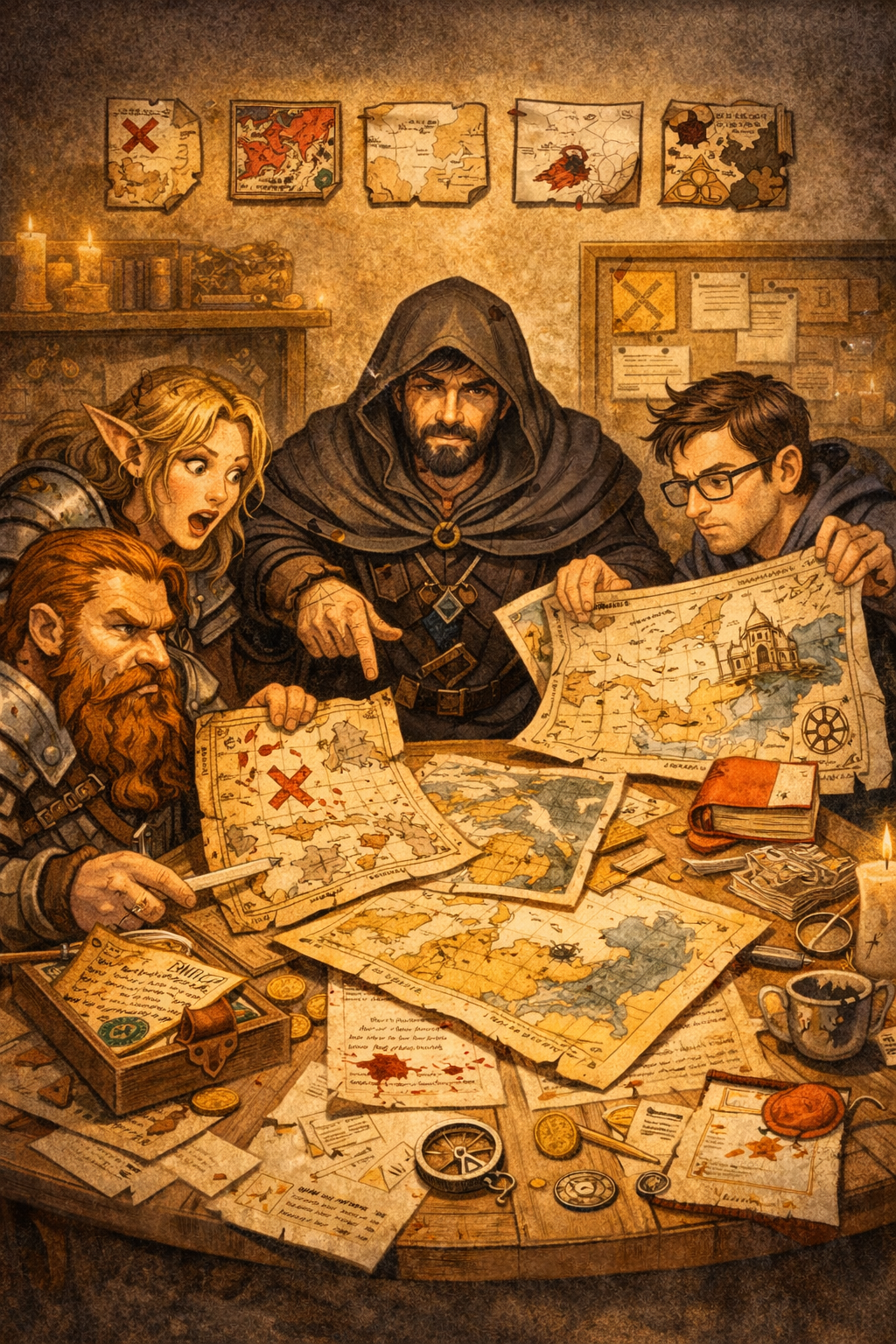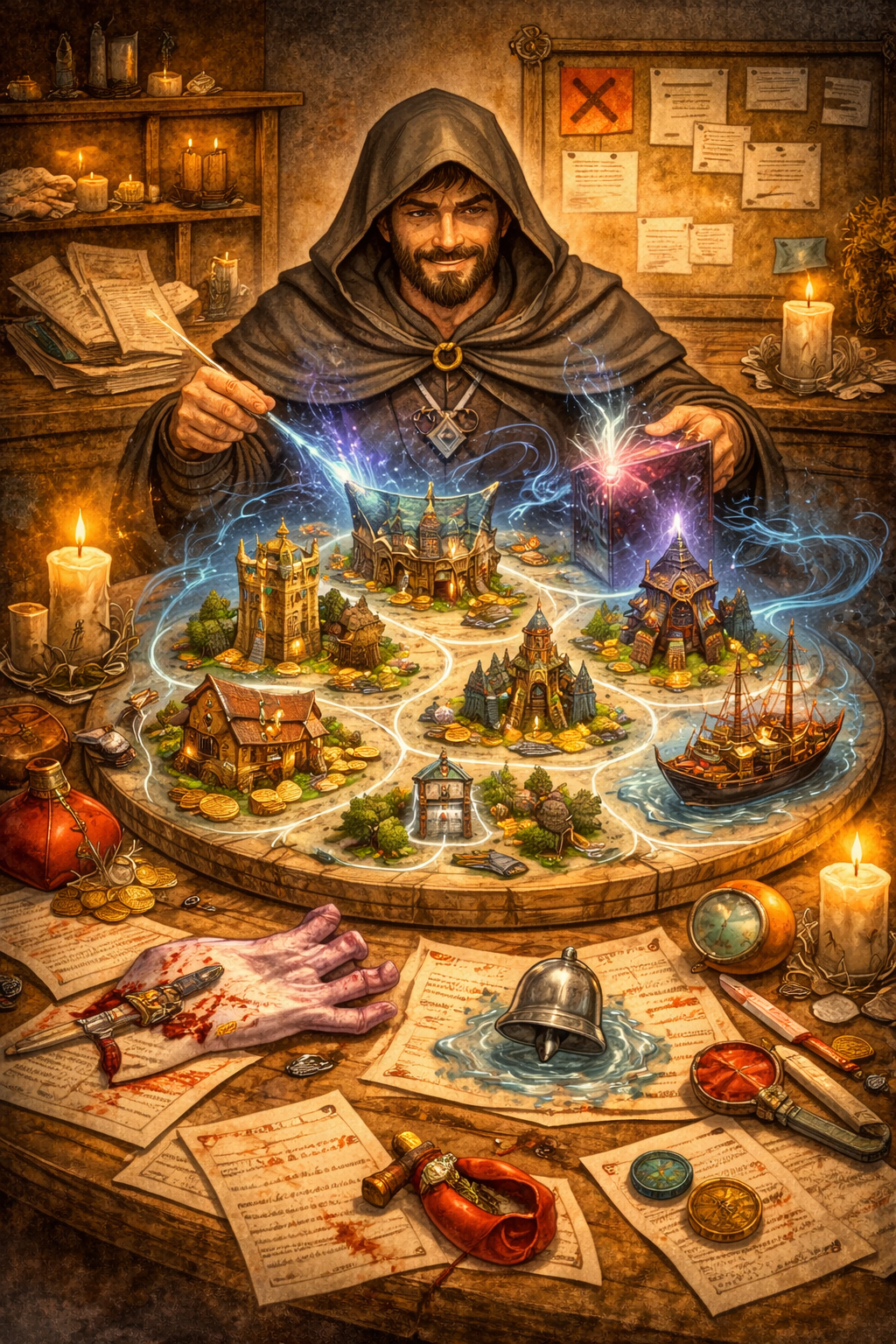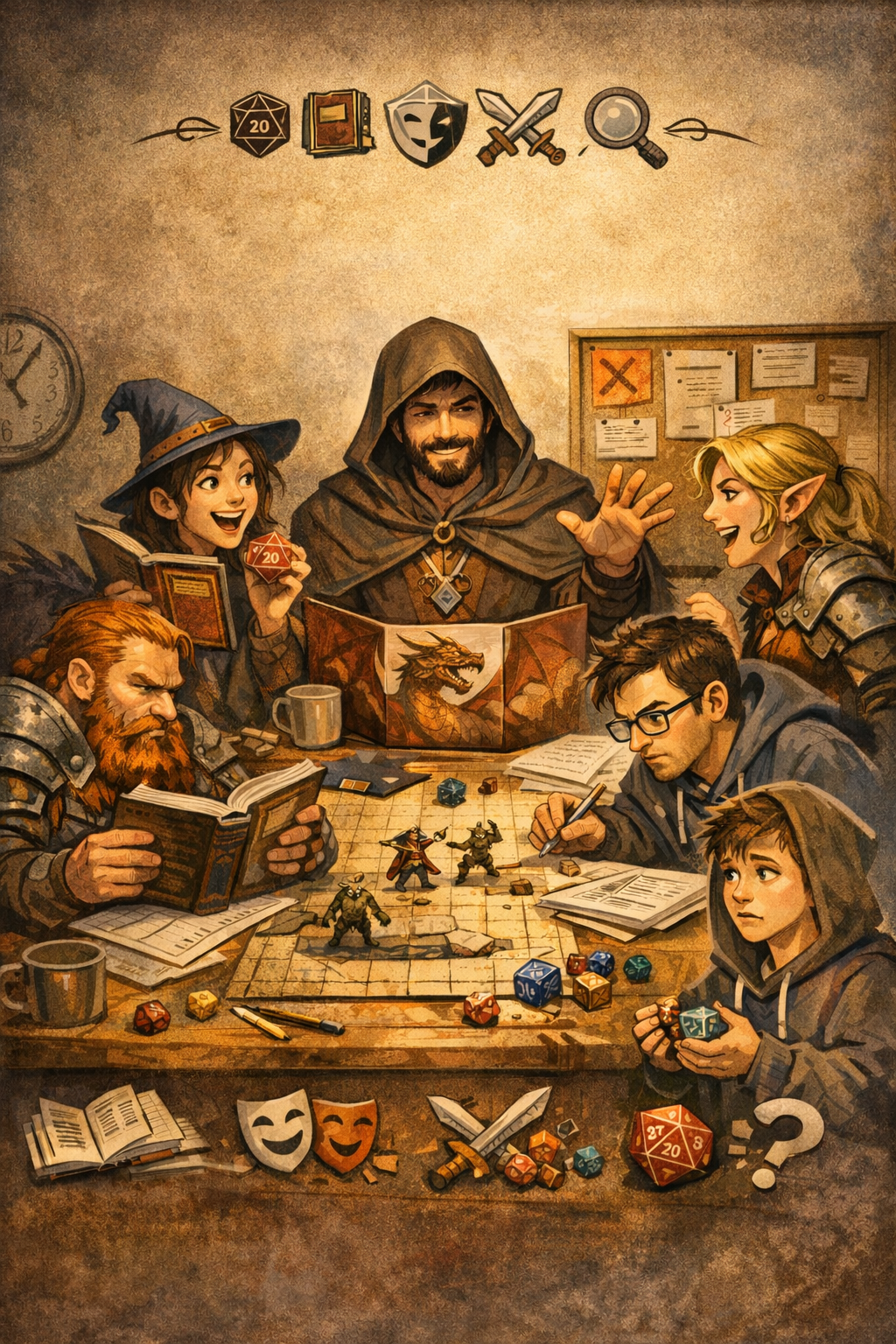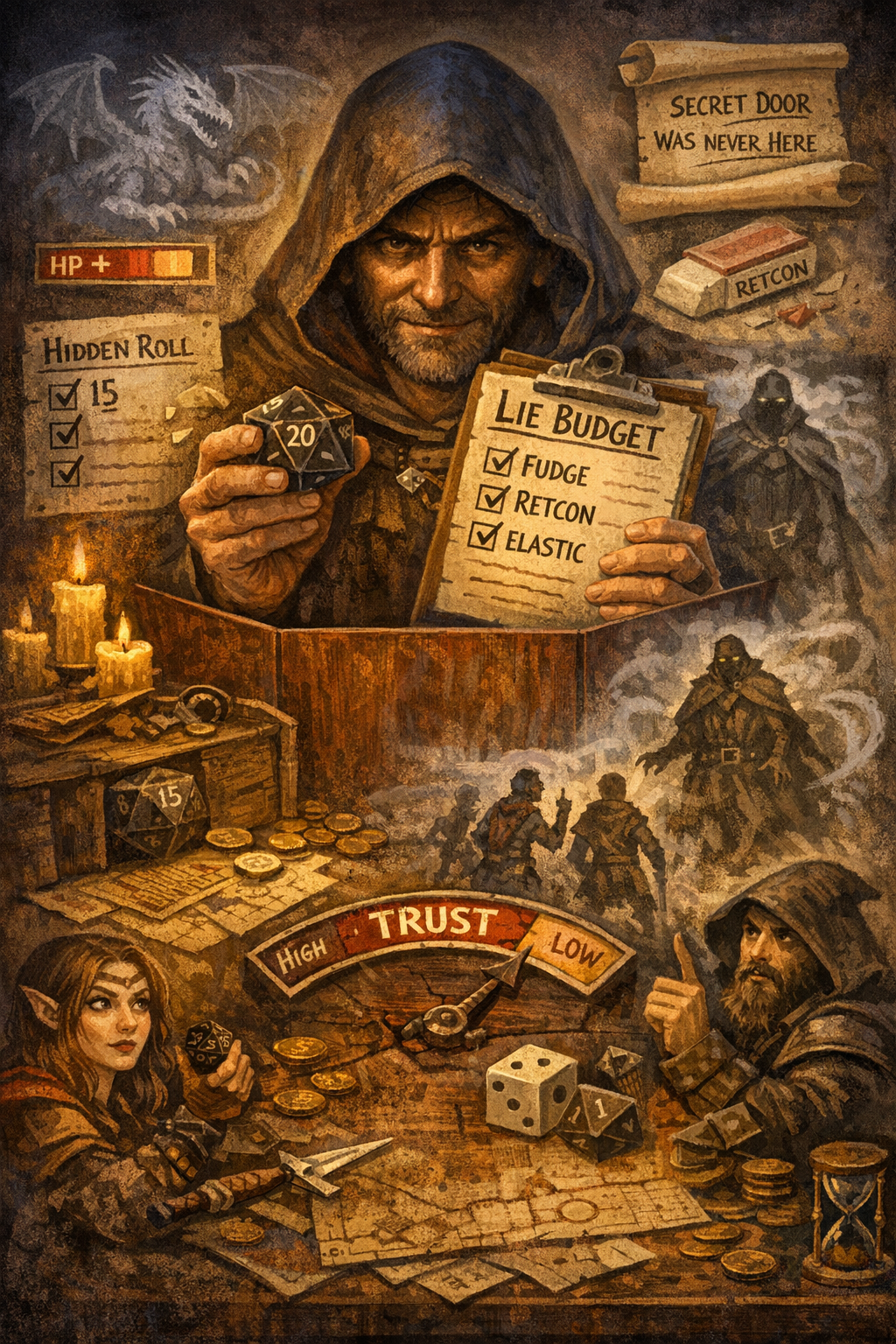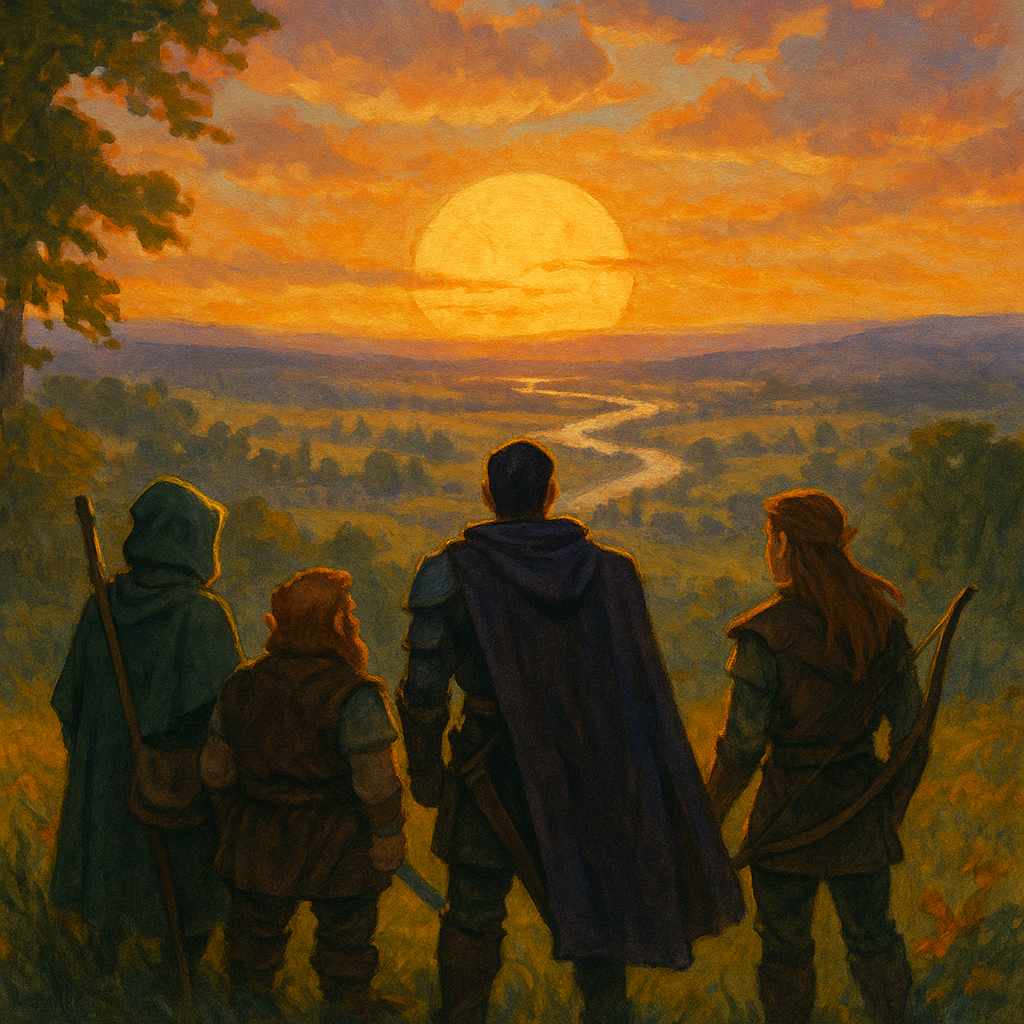Non-Combat XP: Rewarding Creative Play Without Rolling Initiative
REwards for roleplaying and choosing not to be violent...
revolutionary, I know...
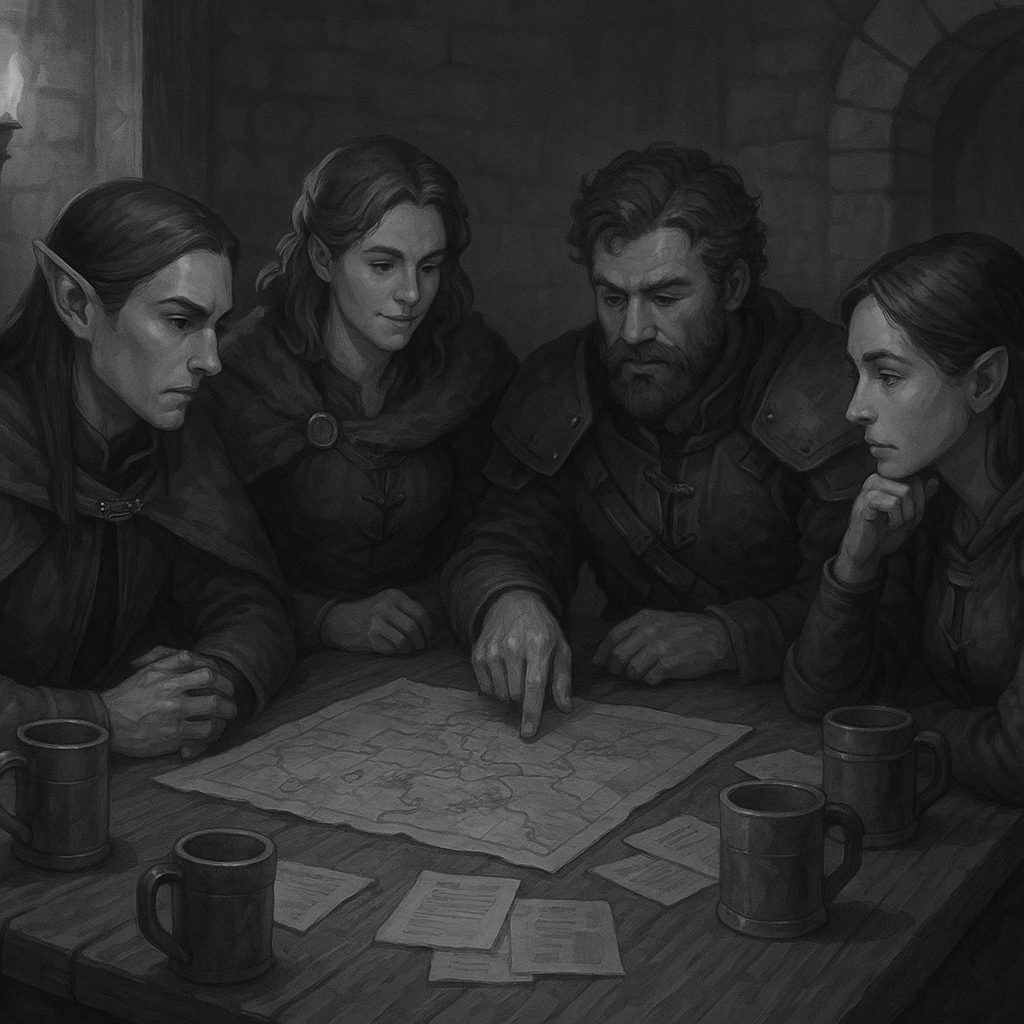
Dear Readers,
The torchlight flickers across the moss-slick stones as your party pauses at the mouth of a forgotten chamber. They can hear faint chanting beyond a carved door but no steel is drawn. Instead of rushing in, they whisper plans, weigh options, and sketch sigils in the dust. It is a moment that many Dungeon Masters dream of: the table has shifted from dice-rolling warriors into storytellers and schemers, weaving an experience as vivid as any battle. Yet when the dust settles, when the plans succeed or fail, a question lingers like the echo of the chanting: how should you reward the players for this kind of creative play?
Dungeons & Dragons has long measured progress through experience points. For much of its history that meant treasure and monsters. Fifth edition softened that with milestone advancement but still left combat as the clearest path to growth. As a result, tables often fall back on combat because it feels like the surest way to gain something tangible. But what if you, as the DM, want to encourage a different path? What if you want your players to earn levels not for the bodies they pile up but for the worlds they build and the relationships they shape?
This post invites you into a different approach: rewarding non-combat achievements with XP in ways that feel natural, satisfying, and dramatic. We will explore how to make that process an integral part of your story rather than a bookkeeping afterthought. You will see how it changes table dynamics, fosters roleplay, and gives quieter players a reason to shine.
The Forgotten Roots of Experience
Once upon a time, experience points were tied to treasure as much as to combat. Players earned XP for the gold they recovered from dungeons, reflecting the game’s roots in exploration and risk-taking. Monsters were obstacles, not goals. Over decades, the emphasis shifted toward fighting as the main reward loop.
Yet the essence of roleplaying games remains the freedom to solve problems creatively. When you tie experience solely to combat you risk eroding that freedom. Players who know they will not level up unless they fight will start fights. Players who know their ingenuity will be rewarded will plan, negotiate, investigate, and dream.
The beauty of D&D is that nothing in the rules prevents you from restoring that balance. Fifth edition’s Dungeon Master’s Guide explicitly suggests granting XP for overcoming challenges without fighting. It even provides loose guidelines for awarding XP based on monster challenge ratings for non-combat resolutions. But most tables gloss over this section. The secret is not just to use the rule but to narrate and integrate it so that the players feel the reward as part of the story.
Shaping the Narrative Around Creative Play
Imagine your party in the bustling city of Calvaris, investigating a series of arson attacks. They interview merchants, bribe guards, trace magical residues through hidden alleys. Not a single sword is drawn. After days of effort they unmask a guild of saboteurs and disrupt a plot to burn down the grain warehouses. If all you do at the end is say “You get 600 XP” the moment passes without resonance. But if you tie the reward to the story you make it memorable.
Describe the city’s gratitude, the way merchants lower their heads respectfully, the guards’ subtle nods when they pass. Mention how news of their deeds travels, raising their reputation. Then, after the scene has unfolded, tell them their XP total and how it reflects the city’s recognition of their success. This method reinforces that XP is not just a number but a narrative marker of impact.
Developing a Philosophy of Non-Combat XP
A common mistake is to treat non-combat XP as an afterthought or a “lesser” award. In truth, it should stand shoulder to shoulder with combat XP. One way to do this is to mirror the challenge ratings of monsters with the difficulty of tasks. If negotiating a peace treaty between warring tribes saves as many lives as slaying a dragon, why not reward it equivalently?
When you plan an adventure, think about the stakes of non-combat encounters. Ask yourself: how risky is this challenge, how complex, how meaningful to the plot? Then match the XP accordingly. This approach makes the reward predictable enough for players to plan but flexible enough for you to improvise.
Telling Stories That Demand Ingenuity
To reward creative play you must first create situations where creativity is possible. This is not about punishing combat but about offering alternatives that feel legitimate. A locked door with a monster behind it offers no incentive to negotiate. But a fortress filled with sentient creatures who have goals, fears, and leaders can be approached many ways.
For instance, picture an ancient dwarven hold taken over by duergar. The party could storm in and fight room by room. Or they could infiltrate as mercenaries, sway a faction of duergar who secretly oppose their tyrant, or sabotage the enemy’s supply lines. All of these count as “defeating” the foe in a narrative sense. When you then award XP equivalent to the full complement of duergar, your players learn that stealth, diplomacy, and cunning are not only allowed but profitable.
Case Study: The Tribunal of Thorns
Let us follow an example campaign arc:
The party enters the Forest of Murmurs to parley with the Tribunal of Thorns, a conclave of dryads who control passage to a sacred glade. The dryads distrust outsiders and have been misled by a rival faction into believing the party are defilers. Combat is possible but deadly.
Instead, the party spends hours gathering information from woodland spirits, composing a poem in Sylvan to honor the Tribunal, and bringing offerings of silverleaf wine. They present their case in a tense diplomatic encounter where every Persuasion roll matters. They succeed in swaying the Tribunal, winning access to the glade and forging an alliance.
Awarding XP here should feel like the crescendo of an opera. Describe how the dryads’ faces soften, how the glade’s sunlight breaks through the canopy, how ancient spirits whisper blessings. Then award XP equal to what they would have earned for defeating the dryads in battle. Make it clear this is not a consolation prize but a triumph recognized by the world.
The Mechanics Behind the Curtain
While narrative is paramount, mechanics still matter. Consistency breeds trust. If players suspect you are handing out XP arbitrarily, they will lose faith in the system. Therefore, create a simple internal rubric for yourself.
For example, treat each significant non-combat obstacle as if it had a challenge rating. Compare the stakes and difficulty to a monster of similar CR. Grant the same XP. Over time you will develop an instinct for these comparisons. A complex political negotiation might equal a CR 10 monster encounter. A daring rescue under cover of night might equal several CR 5 encounters.
Also consider cumulative XP for multi-stage challenges. If the party undertakes a three-part investigation, grant XP at each stage for progress, then a bonus at the conclusion. This keeps momentum going and signals that each choice matters.
Roleplaying Rewards and Player Agency
One of the joys of non-combat XP is how it empowers different player archetypes. The charismatic bard, the investigative rogue, the scholarly wizard all get moments to shine outside of combat. But it also invites shy or newer players to participate.
As DM, pay attention to who initiates non-combat solutions. Encourage collaboration. When a quieter player proposes a clever idea, spotlight it in your narration. Then when you award XP, acknowledge their contribution explicitly. This fosters a culture where ingenuity is celebrated.
You can even allow players to suggest how they think they should be rewarded. After a major non-combat scene, ask “What do you think your characters learned from this experience?” Use their answers to shape the XP narrative. This turns the reward into a conversation rather than a decree.
Avoiding the Pitfalls
There are dangers in shifting heavily toward non-combat XP. Some players enjoy combat as their primary form of engagement. Removing it entirely can make them feel sidelined. The goal is not to abolish combat but to balance it with equally compelling alternatives.
Another pitfall is making non-combat rewards feel trivial. If your party negotiates a truce that averts a war, do not hand them a paltry sum of XP. Doing so undermines the lesson you are trying to teach. Similarly, avoid giving XP for trivial actions like “talked to a shopkeeper” unless that conversation genuinely advanced the story or involved risk.
Weaving XP Into the Story Arcs
One effective technique is to map XP rewards to story beats rather than encounters. Think of your campaign as a series of arcs. Each arc contains challenges both combat and non-combat. When the arc concludes, award XP proportionally to the characters’ accomplishments.
For instance, an arc about stopping a cult might involve three combat missions, two investigations, and one tense negotiation with city officials. Tally the XP for all of these at the end and award it as a single package. Players see their entire range of actions rewarded as one cohesive experience.
This also allows you to foreshadow XP rewards. Hint that uncovering certain information or forging certain alliances will be as valuable as winning fights. This encourages players to diversify their strategies.
Building Worlds That Respond to Player Choices
Non-combat XP is not just about numbers. It is about making your world feel alive. When players choose a peaceful or cunning route, show real consequences. Maybe the enemy faction is weakened and flees before a fight can occur. Maybe a new ally provides resources for future adventures.
When you narrate these consequences vividly, the XP becomes a secondary but reinforcing reward. Players feel the satisfaction of having changed the story and then see that satisfaction mirrored in their progression. This loop creates a virtuous cycle where creativity begets narrative impact which begets advancement.
A Story of Intrigue in Belthamar
Let us explore another narrative to illustrate these principles:
The adventurers arrive in Belthamar, a city of marble palaces and underground canals. A masked noble hires them to discover who is poisoning the city’s water supply. Rather than break into houses and fight guards, they slip into salons and libraries, question street urchins, bribe a rat-catcher to map hidden tunnels, and piece together clues like detectives.
At one point they find themselves at a masquerade ball where the suspected culprit will attend. Instead of drawing swords they perform music, dance with informants, and slip notes under plates. The evening becomes a social battlefield where wit and charm replace blades.
At the climax they corner the true villain in a hidden conservatory filled with poisonous plants. A tense dialogue ensues, mixing intimidation and persuasion. The villain confesses and flees into exile, averting a bloody showdown.
When you reward XP for this, frame it as recognition of their mastery over intrigue. Describe how the city’s fountains run clean again, how their names circulate in whispered gratitude. Then grant XP equal to what a combat-heavy resolution would have earned. Your players will remember that ball as vividly as any dragon fight.
Incorporating Character Goals
One of the richest veins for non-combat XP lies in personal character goals. Encourage your players to write short-term and long-term goals for their characters. When they take steps toward those goals through roleplay or creative problem-solving, award XP.
This method not only motivates players but also helps you shape the campaign. If a cleric seeks to convert a village to their faith, if a rogue seeks to found a thieves’ guild, if a bard seeks to compose an epic about their travels, you can build scenes around those goals. As they succeed, grant XP to reflect their growth as heroes, not just adventurers.
This creates a deeply personal connection between advancement and story. Characters stop being bundles of stats and become protagonists with arcs.
Integrating Faction and Reputation Systems
Consider creating factions or reputation tracks tied to XP. When the party gains favor with a guild, temple, or kingdom through non-combat actions, give them XP plus tangible benefits like contacts, discounts, or influence. This blends narrative, mechanics, and progression.
For example, in a campaign where the party works with the Circle of Green Wardens to restore polluted lands, you might award XP every time they cleanse a grove or broker a truce between loggers and druids. Over time their reputation grows, unlocking new quests and boons. This turns non-combat play into a self-sustaining loop of reward and opportunity.
The Long View: Character Development Through XP
Leveling up represents not just power but learning. When you tie XP to creative play you reinforce the idea that characters grow through experience, not just battle. A wizard who spends a week deciphering an ancient codex learns as much as one who hurls fireballs at orcs. A fighter who negotiates a treaty learns leadership and tactical insight.
Describe level-ups in that language. Instead of “You hit level seven” say “Your days of quiet investigation and delicate diplomacy have honed your instincts. You now possess abilities you could not have imagined when you first entered this city.” This narrative framing transforms advancement into a story beat.
Teaching Players the Value of Non-Combat Play
If your players are used to combat-centric play, introduce non-combat XP gradually. Begin with small but clear rewards for cleverness. Praise their ingenuity in narration. Show how avoiding a fight can lead to richer consequences and still grant full XP.
Over time they will internalize the lesson and begin seeking creative solutions proactively. You will find your sessions becoming more diverse, with a blend of tactical combat, social intrigue, exploration, and mystery.
An Evening at the Moonstone Inn
Let us conclude with a final story:
The adventurers sit in the common room of the Moonstone Inn, poring over maps and rumors. They know a bandit lord controls the trade road through the Valley of Echoes. They could gather allies and wage war, but instead they devise a plan to infiltrate the bandits, sow discord, and take control from within.
Over weeks of play they bribe sentries, whisper to discontented lieutenants, forge false letters, and gradually undermine the bandit lord’s authority. At last the gang collapses without a battle. The valley becomes safe for travelers and merchants again.
The players have spent more time plotting than rolling initiative, but the table is electric with excitement. They have shaped a region’s destiny. When you award their XP, describe how the valley’s folk erect stones in their honor, how bards sing of the invisible war they waged. Their characters level up not because they killed the bandits but because they mastered the art of strategy and subterfuge.
Final Reflections
Non-combat XP is not a trick or a house rule. It is a return to the core promise of roleplaying games: that imagination and choice matter. When you as the DM recognize and reward that imagination, you create a table where every player, not just the fighter with the biggest sword, can be a hero.
You are not simply handing out points. You are telling your players, “The world responds to your creativity. Your story matters.” That is a powerful message. It deepens immersion, encourages experimentation, and ultimately makes leveling up feel earned and alive.
So the next time your players stop at the mouth of a dungeon, or a city’s gates, or a king’s hall, listen for the pause before combat. Give them space to imagine another way. And when they take it, reward them as heroes who have shaped the world without drawing a blade.
Until next time, Dear Readers…
















